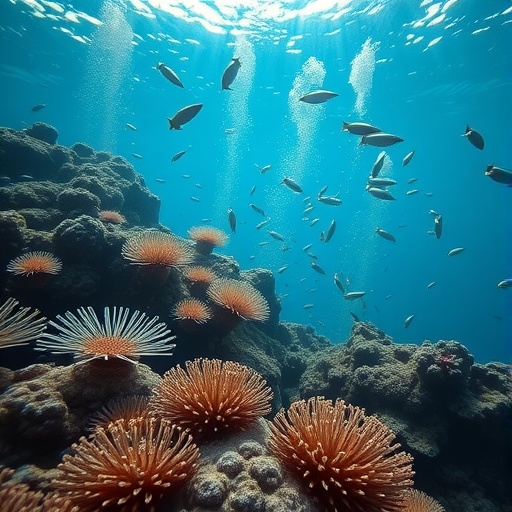In a staggering revelation for marine ecologists and conservationists alike, recent research has unveiled a significant decline in the populations of the sea urchin species Diadema antillarum across the Mesoamerican barrier reef in Honduras. The study conducted by Cramp, Exton, Bodmer, and their team covers a critical timeframe from 2014 to 2022, revealing alarming insights into how this decline has been affecting the benthic communities that depend heavily on the health and stability of these marine ecosystems.
The decline of Diadema antillarum, commonly known as the long-spined sea urchin, is particularly concerning given its vital role in maintaining the structure of coral reef ecosystems. As a primary herbivore in these areas, the sea urchin contributes to the control of algal populations that can otherwise overgrow corals and lead to the degradation of reef habitats. The study highlights that the populations of D. antillarum have seen an unprecedented decrease, raising fears about the overarching health of the reef system itself.
Between 2014 and 2022, researchers recorded a decline of up to 90% in some local populations of D. antillarum. This dramatic decrease has been associated with several factors including disease, climate change, and overfishing. Researchers are particularly concerned about the coral reef ecosystem’s resilience, as the absence of healthy sea urchin populations can lead to unchecked algal growth. In turn, this can smother corals and inhibit their ability to thrive in an already challenged environment.
The phenomenon has been dubbed a “tipping point” for reef health in the study, as it poses many cascading consequences for marine biodiversity. With D. antillarum being a keystone species, its decline could lead to a ripple effect that endangers myriad species within the reef ecosystem. These include not just corals but also a multitude of fish species and other benthic organisms that share this habitat.
Additionally, the study discusses the broader implications of climate change and human actions on marine resilience. With increasing ocean temperatures, coral reefs are already under stress through bleaching events. The compounding factor of D. antillarum decline may further diminish the ability of reefs to recover from environmental shocks, leading to long-term changes in ecosystem structure that could take decades to be undone.
Effective management and conservation strategies are urgently needed to address these challenges. The researchers call for a multi-faceted approach that includes reducing local stressors such as pollution, enhancing marine protected areas, and implementing sustainable fishing practices. Their findings stress the importance of preserving the remaining sea urchin populations to bolster the resilience of coral reefs, which are already grappling with environmental degradation.
Moreover, the study emphasizes the role of policymakers in recognizing the significance of D. antillarum and its related ecosystems. It advocates for interdisciplinary collaborations involving ecologists, marine biologists, and policymakers to ensure effective policies are put in place. The success of conservation measures will depend heavily on engaging local communities and educating them about the importance of these species in maintaining a balanced marine environment.
While the findings are alarming, they also spark a call to action. Acknowledging the complex interdependencies in marine ecosystems is crucial for crafting effective strategies. The results from this study underscore that we are at a critical juncture where concerted efforts can still make a meaningful impact. Without decisive action, the long-term health of the Mesoamerican barrier reef and its myriad inhabitants remains at serious risk.
As the scientific community absorbs these findings, attention must shift not only to the immediate implications for D. antillarum but also to the larger picture of marine biodiversity at risk due to anthropogenic influences. The urgency is clear: Enhancing our understanding of these dynamics is imperative as we strive to reverse trends that threaten the very fabric of marine life in these rich ecosystems.
In conclusion, the decline of Diadema antillarum in the Mesoamerican barrier reef is a stark reminder of how interconnected our oceans are, and how sensitive they can be to a variety of pressures. The research led by Cramp and colleagues paints a vivid portrait of urgency and highlights the pressing need for immediate conservation efforts. As we forge ahead, the knowledge gained from this critical study can guide us toward ensuring that these ecosystems not only survive but thrive for future generations to enjoy.
The narrative of marine collapse is not merely an environmental tale; it is one that encompasses human impact, responsibility, and the hope that through informed action, we can halt the downward spiral and restore balance to our oceans.
Subject of Research: Decline of Diadema antillarum populations and their ecological impact
Article Title: Steep decline in Diadema antillarum populations in Honduras’ Mesoamerican barrier reef (2014–2022) and its impact on benthic communities.
Article References:
Cramp, R., Exton, D., Bodmer, M.D.V. et al. Steep decline in Diadema antillarum populations in Honduras’ Mesoamerican barrier reef (2014–2022) and its impact on benthic communities.
Coral Reefs (2025). https://doi.org/10.1007/s00338-025-02778-8
Image Credits: AI Generated
DOI: https://doi.org/10.1007/s00338-025-02778-8
Keywords: Diadema antillarum, coral reefs, Mesoamerican barrier reef, ecological impact, marine biodiversity.




